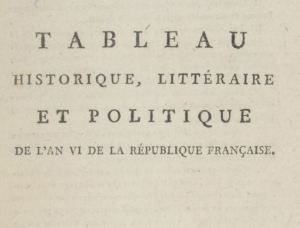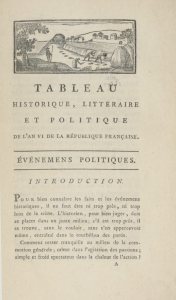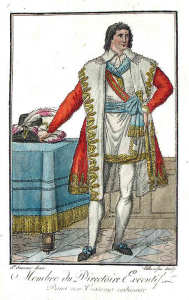It’s simply astonishing what one can now find on-line. In the way of any wander through library stacks, I came upon this title on Gallica.bnf.fr, the French national library on-line:
Tableau historique, littéraire et politique de l’an VI de la Républic française.
Of course it was not at all what I was looking for, but although “You can’t always get what you want, but if you try sometime, you find you get what you need.” :-)
I love the way the digital book opens with its cover:
And then turns to the marbled end-paper:
Here’s a crop of the title page:
(You can almost feel the rich texture of the paper.)
And then, the first chapter division:
What caught my attention “leafing” through this book was the section on legislation, a daily account of laws passed in the years 1798-1799.
They are very detailed: they needed to be. The French government was (once again) creating a government from scratch. Laws mentioned cover passport regulations, import duties, the re-establishment of a national lottery, the legislateurs’ own schedule (they will no longer meet on décadis (the end of the 10-day week), patents, manufacture of goods, the “uniform” to be worn by the members of the legislature …
“…habit français, couleur bleu national, croisé et dépassant le genou. Ceinture de soie tricolore, avec des franges d’or. Manteau écarlate à la grecque, orné de broderie en laine. Bonnet de velours, portant une aigrette tricolore.” – page 142
Alas, I am unable to find an illustration of this costume. No doubt they were somewhat more circumspect than those from 1796. Below left, Executive Director from 1796, compared to Napoleon’s uniform of choice as First Consul on the right:
The legal record is many pages long, but I’ll note a few:
One law passed condemns to death those who rob by force or violence. This is significant because violent crime had become rampant.
Marriages (which must be civil) could only be held on décadis.
One significant law, passed 12 Nivose, an VIII (January 1, 1799), declares that Blacks born in Africa or in foreign colonies, and transferred to French islands, were free as soon as they step foot on French soil. The Revolutionary government had several years before outlawed slavery in France, but I don’t believe that it had gone so far as to declare it illegal in its colonies. (I should note that Napoleon will eventually reinstate slavery in the French colonies, and no: it was not Josephine’s doing.)
It’s delightful how worthwhile procrastinating can be. I found an excellent Revolutionary calendar (more on that later), learned the date when there was an eclipse of the moon, what the new national fêtes were to be, and much, much more.








